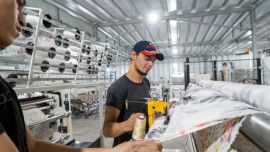Packed restaurants, long lines outside the theatre, concerts that sell out in hours – Argentines with purchasing power are responding with a frenzy of consumption in the face of soaring inflation, which totals 114 percent in the last 12 months.
"We are very tired of economic problems," 25-year-old chef Santiago Basavilbaso told AFP as he shopped for fresh produce for his restaurant. "People are probably used to many years of living without stability. When the end of the month comes... people just want to enjoy themselves."
For many, the situation means rushing to the shops as soon as possible after pay day to buy groceries before prices increase.
Many have had to switch to cheaper brands. Some have learnt to make do without certain products. For those with a bit of money left over, no point saving.
"Today life is a little more precarious. I have had to change my tastes, modify my purchases and perhaps switch to other cheaper brands. But I am not going to stop enjoying [life]. We try to adapt ourselves to the economy of the country," said Basavilbaso, as he scoured prices for the best deals for his business.
Argentina suffers from one of the highest inflation rates in the world. Rising prices have been a chronic ailment, but are now spiking at around eight percent a month, the highest level in 30 years. Around 40 percent of the population lives in poverty.
"Today, with inflation of 110 to 120 percent per year, the most difficult thing is to know if what you are buying is cheap or expensive," said economist Martín Kalos of EPyCA Consultants. "We have lost any price reference."
"Consumer strategies today have been passed down by family, they are behaviours that our parents and grandparents used all their lives," he added.
Pizza or vacation
Economic analyst Salvador Di Stefano of the Estudio SDS consultancy firm said buying a house or car is beyond the reach of most, with interest rates on loans of up to 150 percent per year. Those seeking a mortgage are scared off. On savings, interest is lower than inflation.
"So what do you do? You spend it," said Di Stefano. "The one who cannot take a vacation goes to a concert, the one who cannot afford a concert goes to eat a pizza and have a beer."
Prices are rising so fast that paying with a credit card can result in big savings – if you pay off your purchase before the interest becomes due.
"Sometimes... I take the merchandise and pay 35, 40 days later. And I play with that: today’s price I pay it later," said 63-year-old Adrián Álvarez, a meditation instructor who uses this method in lean months. Sometimes he makes ends meet and sometimes he doesn't.
"When I can't make ends meet, I use the credit card. When I don't have enough, I use my credit card," he explains.
"You have to live within your budget. Oil, salt, bread or coffee increase in price almost weekly," he said.
"When I can't make ends meet, I use the credit card. When I don't have enough, I use my credit card," he explains.
In the supermarket where Álvarez does his shopping, there are deals galore: take two of the same product and pay only 30 percent for the second, or use the card of a specific bank to qualify for a discount.
Clothing and appliance stores have similar plans, and some offer payments over 12 months.
Buy in bulk
"Inflation encourages people to spend faster because saving is difficult," said Kalos. "Wages are spent faster and faster. Money spends less time in the hands of those who earn it because it loses value."
"There is a wide variation of prices. It is difficult to know whether what you are buying is cheap or expensive because the reference is constantly lost," he added.
In this swamp of prices and offers, Ricardo Nasio, the president of the Proconsumer consumer protection association, recommends comparing before committing.
"It is important to have a consumer culture, to check all the prices before buying. It is very good... to buy food that lasts, not perishable food... so that when the price increases, it can be consumed at the old price," he said.
"Another [idea] is for families to club together" to buy cheap products in bulk, and store it among them, said Nasio.
related news
by Valentina Torres, AFP


























Comments